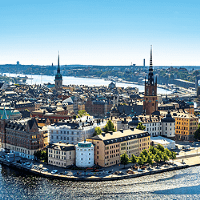▲ Dublin is a credible contender for London’s financial crown
Which European city stands to gain London’s financial crown as Brexit looms?

London’s financial services sector will see some partial relocation but those parts that do relocate are unlikely to go to a single city in Europe. Rather, different banks and financial institutions will be dispersed, or disperse some of their functions, to several different European cities according to their need. Each of these cities will offer different attractions and strengths but none fully replicate what London has been offering for the last three decades or so. So which cities are likely to be top of the shopping list for financial occupiers?
On the face of it, Paris has seemed to be an obvious alternative because of its economic size and world city ranking. However, cities with smaller but more focussed capability may be seen as preferable by a large number of banks and other companies, especially if they are capable of attracting the type of workforce they need.
On this basis, we think the shortlist for alternative European financial cities are:
1. Amsterdam – due to its cultural offer and English language capabilities
2. Dublin – because of its corporate tax framework and English language
3. Madrid – as it is a global scale city with strong cultural attractions
4. Frankfurt – as the financial services city for Europe’s biggest economy and the European Central Bank (ECB)
5. Paris – due to its size and ranking
To help assess the suitability of these locations for financial companies, we have looked at three principal factors. First, the regulatory framework, tax treatment and ease of doing business in these jurisdictions, second, the prevalence of English speaking people, essential in global commerce and third, the cultural attractiveness of the city as a draw to the global banking elite.
By this measure, the smaller cities of Amsterdam and especially Dublin might be considered in a strong position, especially relative to Paris where corporate taxes are 50% more than the European city average and personal social security rates are also high. A reputation for lighter-touch government in areas of taxation, both corporate and personal, labour and business regulation is likely to count strongly in favour of a location with the banking and financial services sector.
.png)
FIGURE 22Ease of doing business - IMD Business legislation global ranking
Source: IMD Global yearbook
English – the language of international commerce
Although small, Dublin and Amsterdam would appear to be well-placed to attract financial service providers needing a strong pool of English language speakers and wanting to locate international staff to places where the international business language is commonly spoken. The capability of a local workforce to converse with other branches and financial centres around the world will be of significant importance.
.jpg)
FIGURE 23English speakers by country
Source: Savills World Research
Cultural attraction
This may seem a rather esoteric factor to have included in this assessment of locations for finance but we know it to have played a significant part in attracting top global personnel in the finance sector to London. The prospect of a family relocation to London from many other world cities is often greeted positively. The cultural draw of a city and its attraction to visitors is likely therefore to play a significant part in a location’s ability to attract key financial talent.
By this measure, Paris is the only city to come anywhere near London but Amsterdam and Madrid are also contenders on cultural interaction. Only Frankfurt looks very weak on this measure. Although Frankfurt does score high on quality of life measures being compact with high environmental quality.
No dominant European global finance alternative
It is notable that, looking at a combination of all these measures, and taking into account the size of its financial sector, London clearly stands out as the most attractive city for the financial sector.
If financial institutions have to consider at least partial relocation into European Union countries, we think that some surprisingly small cities, namely Amsterdam and Dublin may stand up as attractive and useful locations for financial services. This may mean that London continues to serve as a global finance centre but in partnership with a smaller European city for passporting functions.
.jpg)
FIGURE 24Ease of doing business - IMD Business legislation global ranking
Source: IMD Global yearbook

▲ London’s cultural draw and ability to attract visitors cements its appeal to the financial sector









